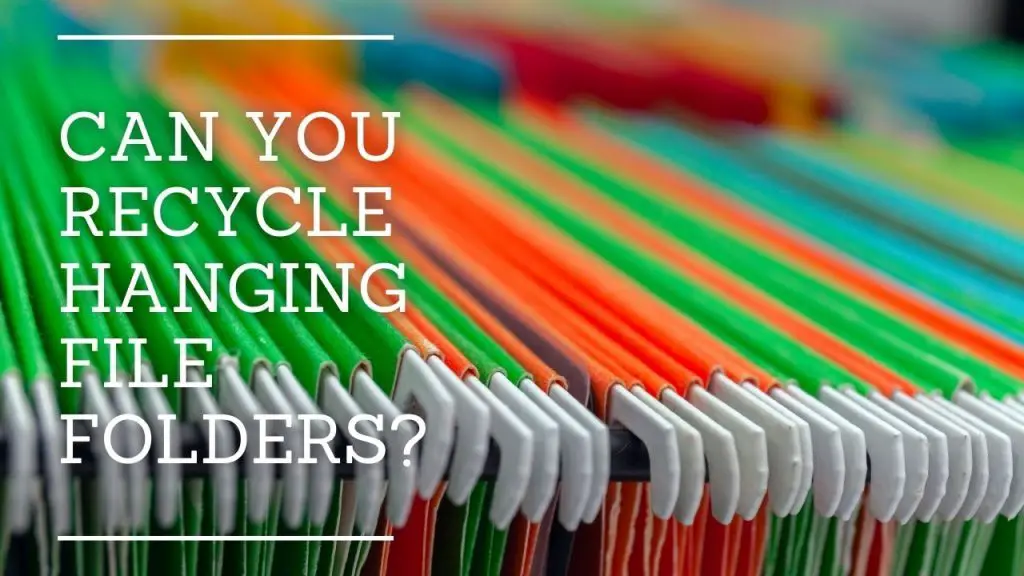Hanging file folders are a staple in many offices and can also be found in homes. While they may seem like small items, the accumulation of hanging file folders in landfills can significantly impact the environment.
But can hanging file folders be recycled? The answer is yes, in some cases.
Different materials are used to construct hanging file folders, such as plastic, metal, and paper. Plastic and metal hanging file folders can often be recycled, while paper hanging file folders can be recycled as long as they are not coated or laminated. It is crucial to determine the material of your hanging file folders before attempting to recycle them.
You can check with your local recycling center to recycle hanging file folders to see if they accept them. Some office supply stores also offer recycling programs for hanging file folders and other office supplies.
Using recycled hanging file folders is good for the environment and can also benefit your business. Recycled hanging file folders are often made from recycled materials and are more sustainable than standard hanging file folders. They can also be cost-effective in the long run, as they may be less expensive than buying new hanging file folders.
Incorporating recycling into your office routine can help reduce the environmental impact of your business and demonstrate your commitment to sustainability. Educating your colleagues on recycling hanging file folders and other office supplies is important to ensure that your business is actively protecting the environment.
Recycling Hanging File Folders
Are you wondering how to recycle hanging file folders? Recycling these office staples to reduce waste and protect the environment is essential. Here are some tips on how to recycle hanging file folders:
- Determine the material of your hanging file folders: Hanging file folders are typically made from plastic, metal, or paper. Plastic and metal hanging file folders can often be recycled, while paper hanging file folders can be recycled as long as they are not coated or laminated.
- Check with your local recycling center: Many recycling centers accept plastic and metal hanging file folders. Contact your local recycling center to see if they accept these items.
- Look for office supply recycling programs: Some office supply stores offer recycling programs for hanging file folders and other office supplies. Check with your local store to see if they provide this service.
- Consider purchasing recycled hanging file folders: Using recycled folders is a sustainable alternative to standard hanging file folders. They are often made from recycled materials and can be cost-effective in the long run.
- Educate your colleagues on the importance of recycling: It is essential to educate them on the importance of recycling hanging file folders and other office supplies to ensure that your business is actively protecting the environment.
Following these tips, you can recycle hanging file folders and contribute to a more sustainable future.
Reusing Hanging File Folders
In addition to recycling hanging file folders, there are other ways to reduce waste and increase sustainability. One option is to reuse hanging file folders. Here are some ways to reuse hanging file folders:
- Use them for a different purpose: If you no longer need your hanging file folders for their original purpose, consider using them for something else. For example, you could use them to organize your craft supplies or file recipes in the kitchen.
- Donate them to a school or non-profit: If you have a surplus of hanging file folders that you no longer need, consider donating them to a school or non-profit organization. They may be able to use them for their own filing needs.
- Sell or give them away: If you have gently used hanging file folders that you no longer need, consider selling them to someone who can use them. This can save them the cost of buying new hanging file folders and reduce waste.
- Repair damaged hanging file folders: If your folders are damaged but still usable, consider repairing them rather than throwing them away. This can save you money and reduce waste.
Reusing hanging file folders can reduce waste and create a more sustainable future.

Alternatives to Traditional Hanging File Folders
There are alternatives to standard hanging file folders if you are looking for more sustainable options for organizing your documents. Here are some options to consider:
- Digital filing: One way to reduce your use of hanging file folders is to switch to digital filing. By storing your documents electronically, you can eliminate the need for paper and physical storage.
- Recycled paper hanging file folders: If you prefer standard hanging file folders, consider purchasing ones made from recycled paper. This is a more sustainable option than conventional hanging file folders made from virgin paper.
- Recycled plastic hanging file folders: Another sustainable option is to use hanging file folders made from recycled plastic. These are often more durable than paper hanging file folders and can be recycled again when they are no longer needed.
- File boxes: Instead of hanging file folders, consider using file boxes to organize your documents. File boxes can be made from recycled materials and can be used over and over again, reducing waste.
By switching to these alternatives, you can reduce your impact on the environment and contribute to a more sustainable future.
The Impact of Hanging File Folders on Landfills
Hanging file folders may seem like a small item, but their accumulation in landfills can significantly impact the environment. Landfills are the final destination for many types of waste, including hanging file folders. When debris accumulates in landfills, it can take up valuable space and release harmful gases into the air.
The impact of hanging file folders in landfills can be minimized through recycling and reusing. By recycling hanging file folders, you can reduce the amount of waste in landfills and help conserve natural resources. Reusing hanging file folders, whether for their original or a different purpose, can also reduce waste and protect the environment.
In addition to recycling and reusing, it is crucial to consider the materials used in hanging file folders. Some materials, such as plastic and metal, can be recycled, while others, like paper, can biodegrade over time. By choosing sustainable materials and recycling when possible, you can help reduce the impact of hanging file folders in landfills.
Overall, the impact of hanging file folders in landfills can be minimized through conscious consumption and proper disposal. You can help protect the environment and reduce waste by making sustainable choices and recycling when possible.
Conclusion
Hanging file folders can be recycled in some cases and reused in others. Recycling and reusing hanging file folders can reduce waste and protect the environment.
There are alternatives to standard hanging file folders, such as digital filing, recycled paper and plastic hanging file folders, and file boxes, which can be more sustainable options. It is essential to consider the materials used in hanging file folders and recycle them when possible to minimize their impact on landfills. Making conscious choices and reducing waste can help create a more sustainable future.

